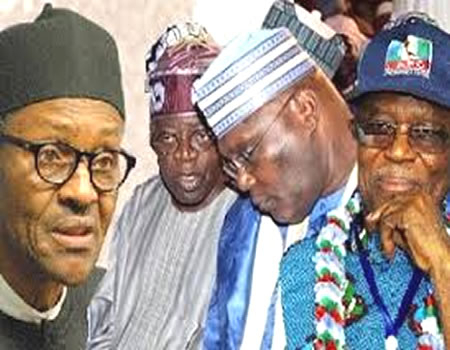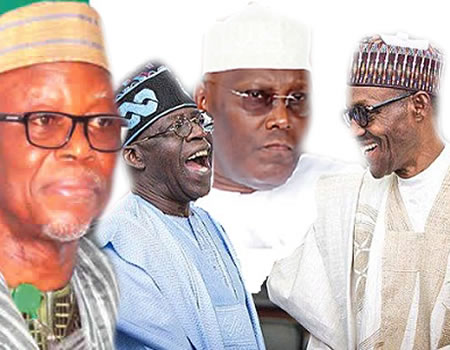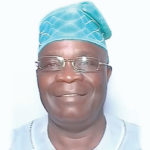IT was long in coming. For months, the exit of former Vice-President, Alhaji Atiku Abubkar, was a matter of time. And it could not have come at a more auspicious time than when the main opposition party is at the threshold of electing substantive national officers and firming up its structures across the country.
Despite of months of speculations that he had made up his mind to dump the APC, Atiku denied any such plan. Even less than 12 hours before he released the letter announcing his exit from the APC, his close associates had maintained sealed lips, kept all arrangements under wraps or chose to play hide and seek. His camp adroitly played along ostensibly with the APC leadership with his media office categorically declaring that the news doing the rounds of his intention to dump the party was the figment of the imagination of the adversaries of the former vice-president. His exit was confirmed way back in September this year when it was foretold by a former member of the House of Representatives, Bala Baiko, having been sidelined in the scheme of things. Hence, Atiku’s eventual letter on the subject-matter only amplified what had become public knowledge, owing to his frequent verbal outbursts on the APC and the Buhari administration. His complaints, which centred on the style of leadership of President Muhammadu Buhari, APC’s National Working Committee (NWC) leadership inertia, coupled with unsuccessful manoevring to play a decisive role over the vacant post of APC’s Board of Trustees (BoT).
Fighting back after those allegations, the APC had cautioned Atiku against making “misleading statements aimed at causing division within the party.” This followed his sustained scathing remarks on the Buhari administration. The National Vice Chairman of the APC (North West), Alhaji Inuwa Abdulkadir, who came on strongly against Atiku and his loyalist like the Minister of Women Affairs, Hajia Aisha Alhassan, questioned her loyalty to the government of the day. The governor of Kaduna State, Nasir el-Rufai, said Alhassan’s open declaration for Atiku did not come as a surprise because, according to him, she had never shared Buhari’s beliefs or ideology.
The height of Atiku’s frustration over the pattern of events in the APC led to the anger he displayed during an interview he granted a foreign radio station. He accused the APC government of marginalising him after leading it to victory at the polls. But, an APC stalwart in the North, Abdulkadir rubbished Atiku’s claim of having been sidelined by the ruling party and its administration, saying: “By virtue of his office and his age, Atiku is qualified to be a statesman but when you reach that stature and age, there are certain things you have to come to terms with, which is to exhibit a high sense of decorum in your conduct. You have to guard what you say, how you say it and when you say it because what is expected of you as a statesman is nothing but factual. More importantly, there should be some decorum in what we do. People who have attained those high privileged positions should know that they have attained certain status in the society and cannot afford to talk anyhow.”
He believed that the contribution of Atiku to the victory of APC in the general election pales into insignificance because Atiku did not attend any of the eight presidential rallies held in the North-West towards the 2015 presidential election. “Of recent, Atiku made some statements that created an impression of the failure of the party and the President Buhari-led government. At that level, good party members, especially of his status, should not be seen to be making public statements even if those criticisms are factual, whereas in this case, some of these statements were misleading and incorrect. These statements give an impression of a crack in the house and in the party or that the party is not doing all that which it ought to. As leaders, we shouldn’t be seen as joining issues in the public domain but since he has made a public statement, the public is entitled to get the other side or be told the truth,” said Abdulkadir.
But as the ding-dong went on in the APC over Atiku’s claim of being sidelined, the Peoples Democratic Party (PDP) began processes towards its elective national convention, with the ward, local government and state congresses in Adamawa turning out to be another avenue to accuse the former vice-president. But again, he did not give any indication as to his preparedness to dump the APC. Atiku and his men had been accused of hijacking the PDP structure in the state, a claim Atiku reacted to by saying it was it was not logical to accuse a non-PDP member of fomenting trouble in the party.
The accusation came against the discontents that characterised the conduct of party congresses in Adamawa State. His former special assistant, Umar Ardo, who raised the alarm had called for the cancellation of results of ward congresses in Adamawa, but Atiku said: “It is ludicrous to accuse a man who is not a member of a party of having hijacked the party structure. Whoever is making this allegation has to look elsewhere for their failings.”
Similarly, even less than 24 hours to exit, his close associates had kept sealed lips or feigned ignorance of the plan. The Adamawa State chairman of the PDP, Mr Tahir Shehu only said they had been wooing Atiku for a very long time. However, Alhaji Lawan Uba, the Director of Mobilisation of Atiku Support Group, was emphatic about Atiku’s exit from the APC, which he said was underscored by the fact his foot soldiers clinched all positions during the PDP ward, local government and state congresses in Adamawa State.
Issue of restructuring
That Atiku had resolved to quit the APC became more poignant, especially with his strong position on restructuring, which President Buhari and the APC are vehemently opposed to. He chose every available forum and opportunity to reinforce the battle line, almost rubbishing the entire administration and accusing it of being bereft of ideas on governance, administration and resource management. The last straw was the move against his major business outfits, Intels, which the authorities accused, along with other companies, of allegedly defaulting to meet their contractual financial obligations to the government.
Prior to the development, however, the mantra of the former vice-president were calls for restructuring. His advocacy for true federalism has endeared him to some power centres, especially in the Southern part of the country and the North-Central. One of his famous declarations of the need to whittle down the power of the central government, a position that drew a wide applause from the advocates of restructuring.
Who next?
A close political associate of former Kano State governor, Alhaji Rabiu Kwankwanso, said his camp was yet to decide on their next line of action. This, he said, was because of some underground consultations across the country to establish a broad-based political coalition that could actually give the ruling party a stiff challenge in the next general election. But this denial has not in any way vitiated the speculations about the sojourn of even the Senate President, Dr Bukola Saraki and that some APC elders from the South-West and North-Central, with Ambassador Yahaya Kwande and a number of others from Benue State that they might forge new alliances shortly.
With his strong links with the PDP, Atiku could swell the number of PDP faithful said to be interested in the presidential ticket of the party for 2019 election. Some of the touted names include a former Senate President, Senator David Mark; a former governor of Jigawa State, Alhaji Sule Lamido, Kwankwanso, and Mallam Ibrahim Shekarau, so far. In a number of state chapters, the APC is enmeshed in a crisis of confidence with the leadership, with most of the members of the legacy parties that formed APC alleging marginalisation. There is also love lost among members of the party in the National Assembly caucus on one hand and the APC top echelon as well as the Presidency on the other hand with insinuations that a number of the aggrieved ones were only waiting in the wings as the political intrigues unfold.
Atiku’s many battles
One matter his associates and supporters said the adversaries and critics of Atiku would not allow to go away from public domain has to do with the Halliburton scandal case. The highly celebrated scandal with international link is often cited as constituting an albatross for the exvice-president. But he has, for the umpteenth times, said he had been cleared of any involvement, accusing those behind the allegation of shadow-chasing and trying to call a dog a bad name in order hang it.
Another major battle the former vice-president has had to fight involved his former boss, Chief Olusegun Obasanjo, who he attempted to succeed as president in 2007, an effort that was sabotaged by the former president. Last week, a prominent voice from the North said Atiku would need the endorsement of Obasanjo to actualise his dream of becoming president. This was in spite of the rapprochement between the two leaders after they left office, which even culminated in a recent visit paid by Atiku to Obasanjo not too long ago. Though the former president has said that he has withdrawn from party politics, some political leaders either rightly or otherwise still consider him a major factor in national politics and its dynamics and other tendencies. And it is recalled that Atiku has tried and failed to be president four times due to the perceived conspiracy of powerful political interests and personalities, one of whom is said to be Obasanjo. But he had at a time gone to Obasanjo to see a reunion and only recently, he was in Abeouta on a visit to confer with the former Nigerian leader. It, however, remains to be seen if the love lost between them had fizzled out and created a new window of opportunity that could make Atiku actuliase his dream and desire to govern the country. In 1999, the pair had been sold to Nigerians as a blend of two great men, convergence of two generations and bridging of the two gulfs of South/Christian and North/Muslim Nigeria.
Implications of Atiku’s exit from APC
His exit is bound to have far-reaching implications within the political circles. One, it is a major loss for the APC, which had relied on his awesome and enormous war-chest, organisational ability as well mobilising capacity, wide network of contacts and structures to complement the contributions of other members towards achieving victory for the ruling party. The APC’s loss might, however, be a gain for the PDP, which he had helped to found and build to a formidable and winning machinery before everything went awry. Though he has not declared officially if he would be rejoining the PDP, which he left in 2013, his entry into the party is bound to alter the calculus and permutation in the power circles and caucuses cum blocs in both the APC and the PDP. Most of the power brokers will be at their wits end in the game plan for the 2019 elections. It is equally instructive that he is likely to face the challenge of confidence in his new haven, given his going in circle within the political space over the years. He has the heavy burden of justifying his vacillation, even though many PDP faithful claim he had only come home to roost like the proverbial chicken. However, there are also issues concerning the campaign for generational power shift come 2019. This is against the background of the campaign for younger politician to be considered for the presidency.
Reactions
The spontaneous and avalanche of public reactions that trailed his exit underscored his place in the political arena. It split the ranks of most Nigerians. The argument of some is that his fourth attempt at taking a shot of the presidency could mark his last as age is no longer on his side. Coupled with it is the gathering campaign for younger generations to be given the opportunity to lead the country. One of the commentators on his exit from APC said: “Atiku should have remained in the PDP and supported GEJ for a second term. Maybe 2019 would have been easier for him, as PDP would have had the power of incumbency. Loyalty has its benefits.”
Another observer said: “Both Atiku and Buhari have run for president in three different parties. You can’t read much into these defections except that parties don’t matter.” Some even described his Atiku’s exit from the APC as good riddance of bad rubbish. “Let’s see how he’d realise his dream in PDP or any other destination,” the commentator stated. Another one remarked: “Last chance for Atiku. It is now or never.”
With the PDP national convention about 13 days away, some political juggernauts are making arrangements to form a new political groups on Tuesday in Abuja. One of the conveners, who spoke Sunday Tribune, said part of the agenda of the group would be announced on Monday. Similarly, another coalition is being linked to the fiery military governor of Kaduna State, retired Colonel Abubakar Dangiwa Umar with the name The Good News Nigeria 2019. The organisers described it as the “biggest political alliance that is bringing together North, East, West and South of Nigeria under a formidable network to vote for one candidate that represents the United Nigeria.”







